4 ingredient Jackfruit dosa
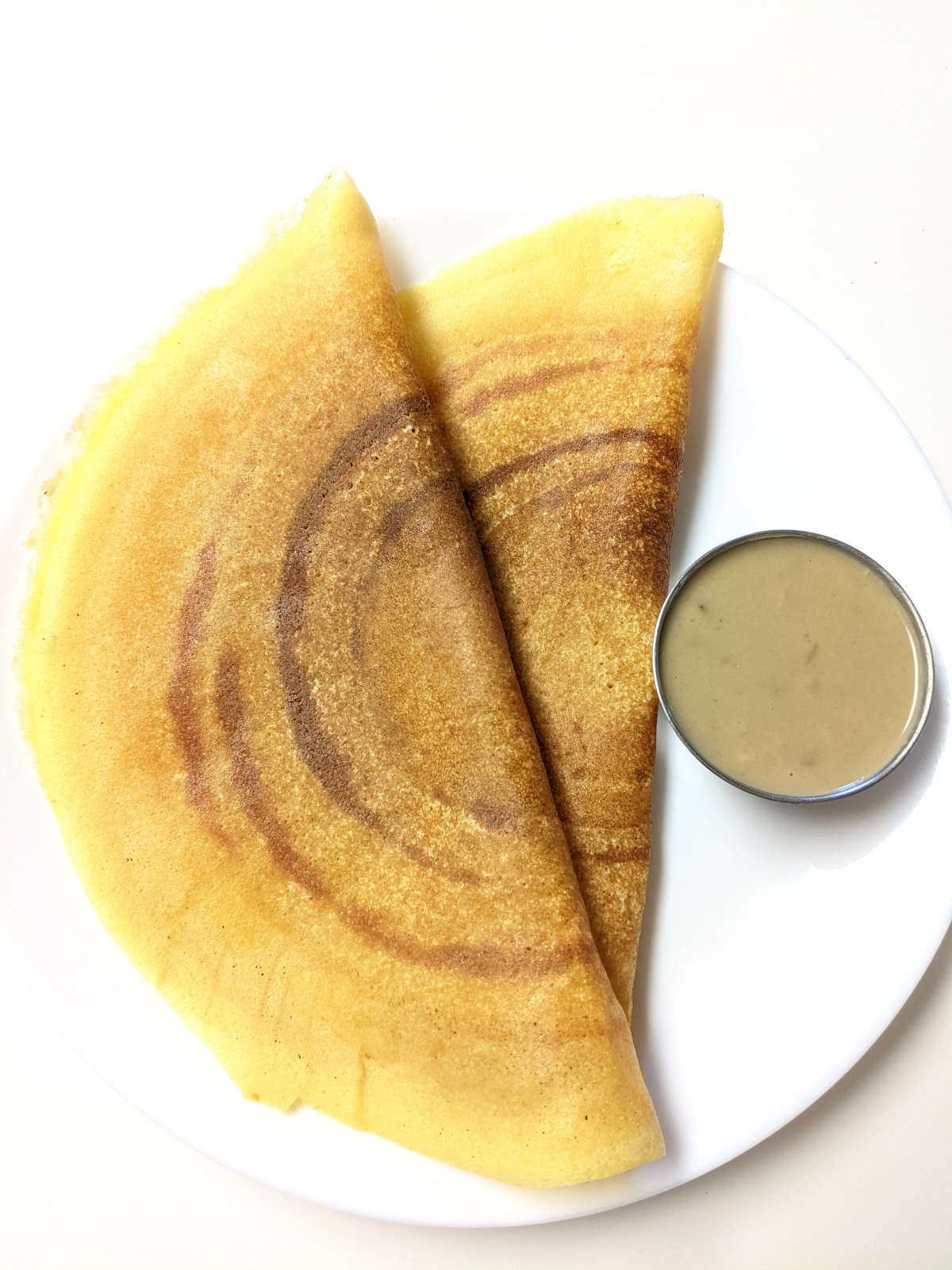
Southern Indian rice crepes flavoured with ripe/unripe jackfruit!
When jackfruits are in season, Jackfruit dosa(pronounced dosé), especially the ones made with unripe jackfruit(halasina kayi dosé) is on the menu in every Havyaka household in the Mangalore region. We have an obsession with anything and everything that contains jackfruit! 🙂 Jackfruit dosa has a beautiful taste, texture and aroma, you should definitely give it a try!
Dosa made with unripe jackfruits(Halasina kayi dosé) and the ones made with ripe jackfruits(halasina hannu dosé), NOT the same! The taste and texture of both dosas are very different. Dosa made using ripe jackfruits are sweeter and may not turn as crispy as the ones made using unripe jackfruit. However, the preparation methods are very similar and this post will help you in making both kinds of dosas.
What kind of jackfruit to use?
Jackfruit takes months to grow and ripen. To make this dosa, you can use jackfruit that’s unripe, just starting to ripen or ones that are completely ripe.
When I say unripe jackfruit do not confuse it for ‘young jackfruit’. Here’s the difference so that you can choose the right kind needed for this recipe. Young jackfruit is baby jackfruit where the pods of jackfruit have not formed yet, the seeds haven’t grown fully as well. When the fruit matures, the pods form and the seeds get bigger and in this recipe, when I say unripe, this is the stage am referring to. It will look like a ripe jackfruit, pods and all, but hasn’t still developed the flavour of a ripe jackfruit. It also has a lighter color, not bright yellow like the ripe ones. (Pictures below)
If living outside of India, you may be able to find such unripe jackfruits frozen, at Indian grocery stores. My go-to brand in USA for frozen unripe jackfruit is called Daily delight green jackfruit.
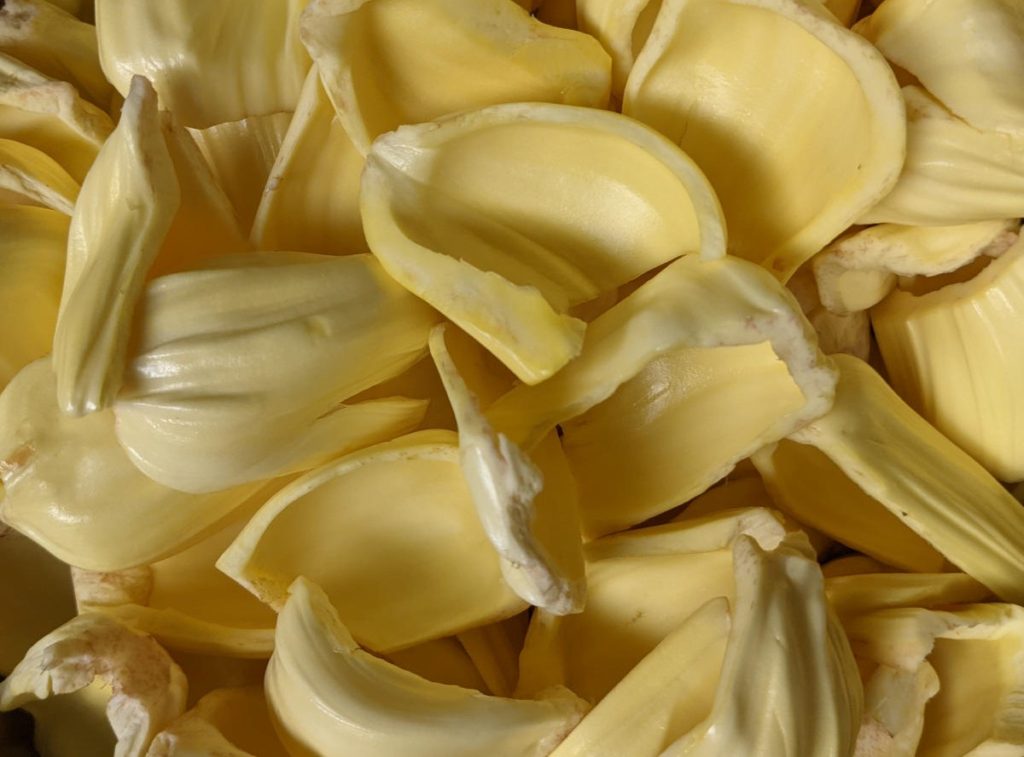
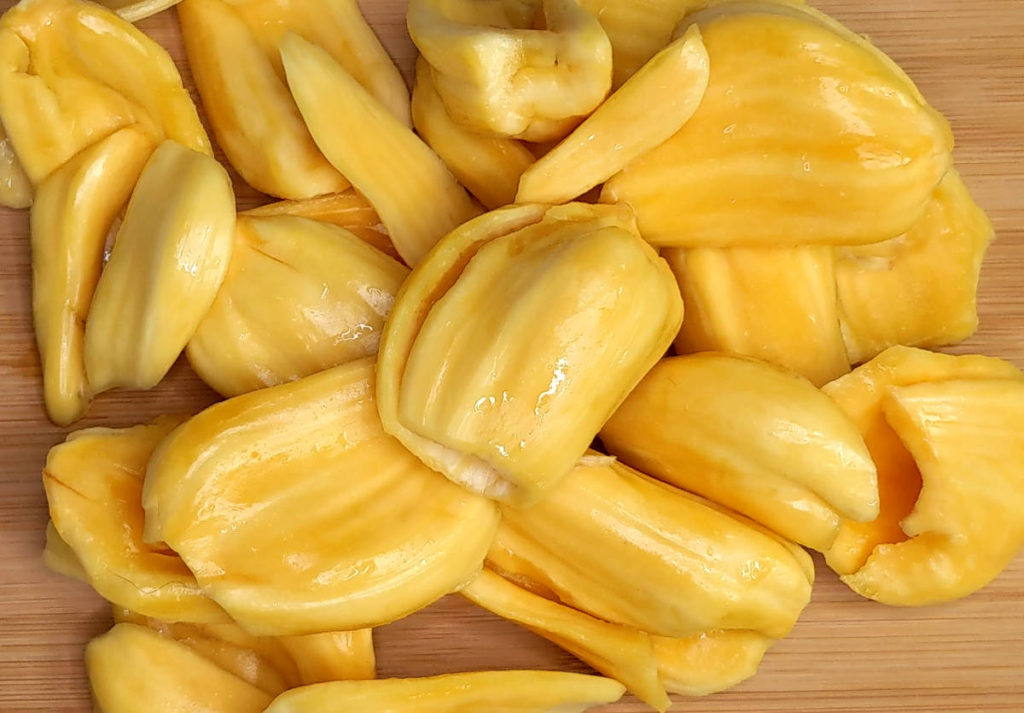
What does jackfruit taste like?
Jackfruit tastes different at different stages. Ripe jackfruit is very sweet with a tropical fruity flavour. Unripe, matured jackfruit tastes nothing like ripe jackfruit. It is mildly sweet when cooked and can be used in savory dishes. Young jackfruit on the other hand doesn’t have the petals formed and is less sweet than mature jackfruit. It is used in savory recipes and lately, has found popularity as a meat replacement due to it’s texture. I would also like to mention here that the textures of young and mature jackfruits are very very different!
To make jackfruit dosas, there is no ONE right ratio of jackfruit to rice. It depends on YOUR preference and also very much on the fruit itself. Jackfruits from two different trees can yield dosas that taste different and also have different textures! 2:1 ratio of jackfruit to rice may work if the jackfruit is just beginning to ripen, but with a fully ripened jackfruit 2:1 may be way too much of jackfruit. Find some tips below to judge the amount of rice needed and some workarounds needed to troubleshoot!
Useful Tips
How to determine the ratio of Jackfruit to rice
- When using unripe jackfruit, you can use 4 parts of jackfruit to 1 parts of rice. So for 1 cup of rice, use 4 cups of unripe chopped jackfruit.
- When using ripe jackfruit, if the petals are still firm and not too ripe, you may be able to use 2 parts of jackfruit to 1 part of rice.
- If the jackfruit is very ripe and the individual petals are soft, it is better to use lesser jackfruit so use 1 – 1 1/2 cups of ripe jackfruit for 2 cups of rice.
If you have grown up eating Havyaka jackfruit dosa, you expect thin crispy dosa, with a lot of Jackfruit flavour. The recipe needs just enough rice to make it release from the tava/griddle. Like I said before, the amount of rice needed can vary from a fruit from one tree to another. If living abroad and using frozen unripe jackfruit, it may be even harder to judge the quantity of rice needed to make the best dosas.
So here is an idea to confidently work with any batch of jackfruit. After blending rice and jackfruit separately, add in the rice batter into jackfruit batter in batches. Try making a small dosa before adding more rice batter into it. If the dosa releases from the tava, you can stop adding the rice batter into it.
It is also a good idea to soak an extra half cup of rice. Blend it separately and keep it handy. In case the dosa sticks to the griddle, it means the batter needs more rice. Use as needed from this reserve. With leftover rice batter make neer dosa!
Troubleshooting
Dosa is peeling from the tava when being spread.
This is probably because the griddle is greasy. Tava should not be greasy when spreading this dosa. If the cast iron tava needs to be greased, wipe away all the excess using a cloth and then spread the batter.
Dosa is sticking to the pan.
If dosa sticks to the tava and you are struggling to release it, it means the batter needs more rice. Rice flour can be added or you could even add regular flour to fix the problem.
Like I mentioned in the tips, I recommend soaking half cup of extra rice and blending it separately, so that if the dosa does stick to the griddle, you have some extra rice batter ready to be added in! The ratio mentioned in the recipe should work fine in most cases, but like I said before, how much rice the batter needs depends on the jackfruit used. So I recommend soaking another 1/2 cup of rice and blending it separately. Prepare neer dosa with any leftover rice batter.
Serving
Serve jackfruit dosa hot with coconut chutney or mango rasayana. Leftover batter can be stored in the refrigerator and used within 2-3 days.
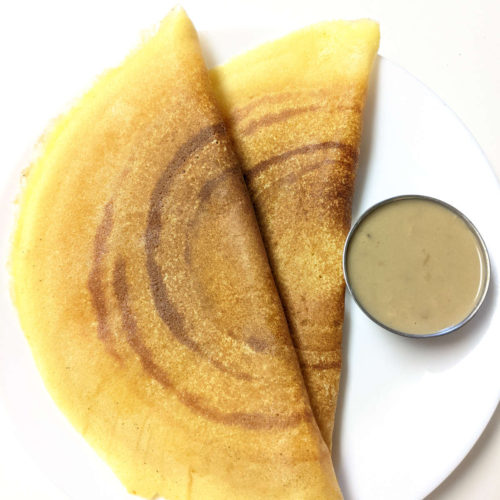
4 ingredient Jackfruit dosa
Equipment
- Tava/griddle, preferably cast iron.
- Blender that can blend rice into a smooth paste.
Ingredients
Measurements for unripe jackfruit(halasina kayi) dosa
- 4 cups chopped unripe jackfruit approximately 400grams
- 1 cup rice 200g, uncooked, check notes for the type of rice
- ½ cup rice uncooked, for reserve batter
- ¾-1 cup water
- salt to taste
- 3 tsp coconut oil
Measurements for ripe jackfruit(halasina hannu) dosa
- 1½ cups chopped ripe jackfruit
- 1 cup rice uncooked
- ½ cup rice uncooked, for reserve batter
- ¾ cup water
- salt to taste
- 3 tsp coconut oil
Instructions
- Add chopped jackfruit into a blender jar, add ¼-½ cup of water and blend until smooth. Remove jackfruit puree into a bowl.
- Drain and add 1 cup rice and ¼ cup water into the same blender jar and blend until the rice is very smooth and no grits remain. Add rice batter into the bowl with jackfruit puree.
- Add ¼ cup water into the blender jar, swirl and add the water into the batter.
- Add salt to taste and mix well. The batter will be thick.NOTE: Almost like a cake batter consistency. Thickness can range from idly batter-regular dosa batter consistency.
- Next, drain the reserve ½ cup rice and add into the same blender with 1/8 cup water and blend to a smooth paste. Reserve this batter separately in a bowl, to be used only if the batter needs more rice.
- Heat a tava/griddle, preferably cast iron on medium heat. If cast iron griddle needs to be greased, wipe away any excess oil or the jackfruit batter will peel away when being spread on the tava.
- When the griddle is hot, pour a ladleful of the batter in the center and use the ladle to spread the batter. Use a circular motion to spread the batter from center to the sides, spreading it as thin as possible. Cover the griddle/tava with a lid.
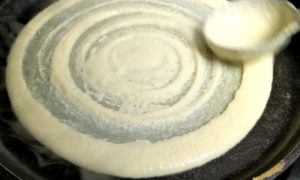
- After 30 seconds, remove the lid and spread ¼ tsp coconut oil on the dosa. When you see the bottom starting to brown, using a thin spatula peel the dosa from the griddle. Note: If you like soft dosa, they can be peeled as soon as they are cooked, if you like them crispy, let them start to brown before peeling.
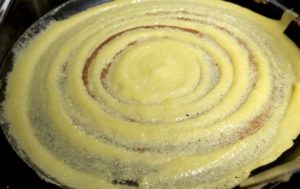
- If the dosa is easily removable from the griddle and does not stick, you do not need to add the reserve batter. If the dosa does stick to the griddle and is hard to peel off, add the reserved rice batter into the dosa batter and mix well. Continue making dosas.
- Serve with coconut chutney/mango rasayana/honey.
Video
Notes
- Unripe jackfruit can be found frozen at Indian grocery stores. Please do not confuse it with young jackfruit.
- I use sona masoorie rice. Regular long grain rice can be used too. Do not use stickier short grain/jasmine varieties.
- Above measurement makes 12 unripe jackfruit dosa and 8 ripe jackfruit dosa.
- If the reserve rice batter was not needed, make neer dosa or cucumber dosa using it.
- 1 cup rice, 4 cups chopped unripe jackfruit.
- 1 cup rice, 2 cups chopped not fully ripe(still firm) jackfruit.
- 1 cup rice, 1 and half cups chopped fully ripe jackfruit.
Did you try this recipe?
Do leave a star rating and comment below to let me know how you liked it! I would love to see the photos too! Tag me on social media!
Thank you so much for stopping by! It really means a lot to me!
I tried the halasina hannu dosa. It was yum 😋. Extremely simple recipe. The tips at each step, helps a novice like me to not freak out. The solutions articulated for all the scenarios that could possibly go wrong, makes this blog special. It was an amazing guided cooking experience. 👩🍳
Yay, am so happy it turned out yum! Thank you so much for trying and for taking the time to leave a detailed feedback! I am so glad the tips and troubleshooting solutions helped!
You explain things very lucidly. Especially about the precautions so that an amateur also can cook like a pro Shwetha.Why don’t you start your YouTube channel??I am your fan.
Thank you so much for your kind words! Makes me happy that you think so, because I consciously strive to make the article understandable to a person who has never even heard of it before. I do have a YouTube channel, I make short videos and I link the video here on the blog for visual learners. The videos however, aren’t very detailed.
Brings back my childhood memories. So yum 🤤
Thank you!!